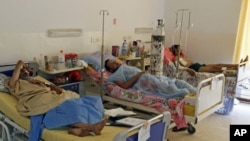Gun battles are only part of the health crisis emerging in Libya’s capital, a city of one-and-a-half million people without running water.
Central Tripoli’s Zawiya Hospital has modern equipment. It lacks basics, though, such as running water and doctors.
Dressed in a blue smock, Mohammed El Busef stops on a busy corridor to say, “We need water. There is no water here in the hospital.’’
Busef is a fifth-year medical student. But when VOA visited, he was in charge.
“Most of the doctors are working 30-40 hours [at a time]. So they are sleeping right now,” he said.
A wounded man moves along the corridor, the latest in a steady flow of victims of the fighting.
“Most of the patients are here because they are wounded by snipers. Some by explosions,” said Busef.
On one bed a rebel fighter has bandaged shrapnel wounds in his right legs. His face has taken on a yellow color, but he is expected to survive.
Two rooms away is the unrefrigerated morgue, holding five bodies.
Across the city, hundreds of bodies still lie unburied in 30-degree temperatures [celsius].
In this modern city on the Mediterranean, services like water, electricity, Internet, telephone and garbage collection are erratic or non-existent.
Mahmoud Shammam, the information minister for Libya’s Transitional National Council, responded to complaints by warning residents “not to expect miracles.”
“About the bodies of some killed people, in some areas, the health authorities are taking care of that and we hope in a few hours, with the help of lot of councils, to solve that problem,” said Shammam.
From New York, U.N. Secretary-General Ban Ki-moon is launching a worldwide appeal for aid to Libya.
"Most immediately, we have asked for urgent humanitarian assistance, particularly as it relates to medical aid and basic public services, including water and sanitation and education,” said Ban.
Meanwhile, back in this sweltering hospital in downtown Tripoli, there is no water to spare to mop blood off the floors.
Busef, the medical student, said, “We gained our freedom by our blood.”
Judging by ongoing gun battles, hospitals in Tripoli may struggle with additional waves of wounded fighters in coming days.




